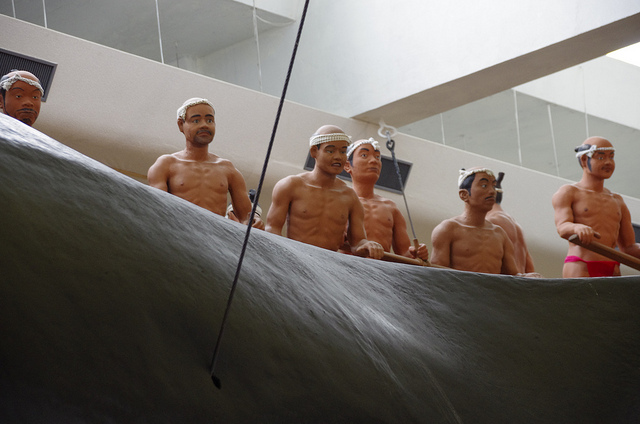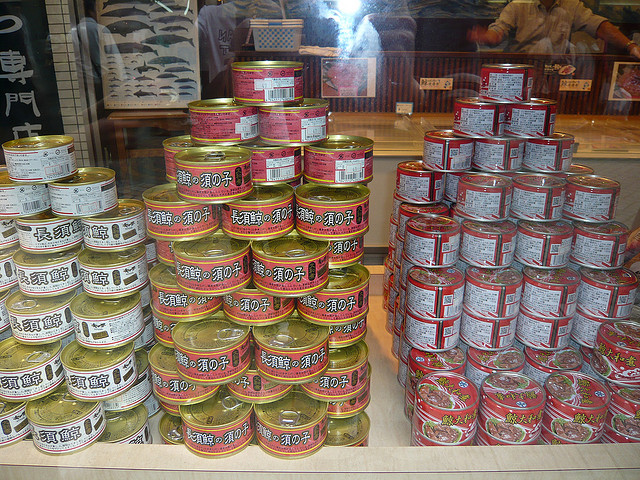Following the International Court of Justice [2] ruling on 31 March 2014 that ordered Japan to halt what the country claims as a ‘scientific research’ whale hunt in the Southern Ocean, Japan's e-commerce giant Rakuten has asked its marketplace users to end [3]all online sales of whale and dolphin products including meat, skin and bones by the end of April.
Though the sale of whale meat is legal in Japan, whale meat sellers often use e-commerce platforms. A whale meat seller [4] [ja] in Nagasaki, which began business in the early 1900s, announced their withdrawal from Rakuten :
<ご報告>
この度、楽天市場が「鯨肉」を禁止商材に決定いたしましたので4月末日までで、”くじら日和 楽天市場店”は退店となります。
<Announcement>
We will close our store at Rakuten at the end of April due to ban on whale meat transaction
Whaling itself has always been controversial in Japan in regard to international relations, and has been a good topic for teachers to take up the issue in classroom discussion, because opinions vary. However, contrary to the diverse discussions seen in classrooms, opinions in the online environment that are loud and most noticeable are the ones on the fringe.
These opinions often advocate defending the custom of hunting and eating whale meat and are often accompanied by patriotism, when the ruling is specifically against the misconduct of Japan's “scientific research”.
 [5]
[5]Taiji Town Museum of Whales exhibiting images of traditional whaling fishermen. Photo taken by flickr user daichi (CC BY NC SA)
Conversation on twitter seemed to be dominated by users who were vocally against the world court ruling and Rakuten's ban, while people with differing opinions – and there are certainly many in Japan who think differently from what online comments suggest – remain silent.
Therefore listing vocal, conspicuous comments probably will not reflect overall rounded general discussion. The following quotes are intended to showcase some of the talking points on the Internet, how unhealthy or healthy the discussion may be.
Conservative pro-whaling netizens booed Rakuten's decision. Twitter user Kukkuri commented:
楽天が鯨肉販売を禁止 イルカも、全店舗に通達 http://t.co/23l6beElya [6] ニュース知って唖然とした。日本包囲網になぜ日本企業が参加するのですか?日本の伝統文化を潰すことがグローバルってことなんですか?
— くっくり (@boyakuri) April 3, 2014 [7]
Rakuten bans selling whale and dolphin meat on its platform. All stores are notified. It's an astounding piece of news. Why would a Japanese company want to take part in besieging Japan? Killing traditional Japanese culture means being global?
One particularly loud advocate for Japan's whaling is an American video blogger in Texas who goes by the name of “Propaganda Buster”. He receives echoes of many Japanese followers behind the keyboard. His many Japanese followers call him “Texas Daddy”.
In a YouTube video translated into Japanese by his supporters whose funding is unknown, he aggressively spoke out against controversial marine conversation group Sea Shepherd, which has actively opposed Japan's whaling:
His videos have been successfully exerting influence on Japanese netizens who find themselves suddenly shaping extremely patriotic voices on the Internet.
While Australians gave a high five [8], Masaaki Sasaki echoes the view of Texas Daddy, and wrote that Sea Shepard would be the most negatively impacted by the International Court of Justice's ruling:
判決を受け、実は最も打撃を受けるのは #シーシェパード [9]。日本が調査 #捕鯨 [10] をやめれば、自分たちの存在をアピールできる反捕鯨キャンペーンを続けることができず、活動の源となる寄付金収入が減るからー捕鯨訴訟判決についての所感 http://t.co/PhAjqw4FSE [11]
— Masaaki Sasaki (@izasasakima) April 6, 2014 [12]
In reality, it is Sea Shepard who will be most damaged by the ICJ ruling. If Japan stops the research-driven whaling, they won't be able to continue campaigning against whaling to justify their existence to their audience, and will then lose donations to fund their activities. What I feel about the ICJ ruling
Author Yusuke Hayashi saw it as a cultural issue:
捕鯨禁止。オーストラリアからの輸入牛肉の関税引き下げ。日本人は明治時代まで牛を食べなかった。鯨を食べるのも、牛を食べるのも文化なんだけど。オーストラリアは多文化共生が好きらしいが、捕鯨文化を否定してるじゃん。鯨は食うな、オーストラリアの牛を食えというのはおかしいと思う。
— 作家・林雄介@児童文学者協会会員 (@yukehaya) April 7, 2014 [13]
Ban on whaling. Reducing the tariff on Australian beef. Japanese people did not eat beef until the Meiji era [14] [in the late 19th century]. Eating whales and eating beef are both cultural. Australia seems to like multiculturalism, but they condemn whaling culture. I think it is wrong for Australia to say do not eat whales, eat Australian beef.
Sociologist Kasuga Sho pointed out that whaling for so-called scientific research is a problem of euphemisms and misleading labels, similar to labor exploitation under the name of Japan's internship training program [15] for foreign workers:
「技能実習」と称する労働力。「調査」と称する商業捕鯨。そのうち前者もどっかの国から提訴されて負けるよね。「そのころには自分は現役じゃないからいいや」と思っている人が制度を作ってるんだろうけど。
— sho kasuga (@skasuga) April 6, 2014 [16]
Labor under the name “technical training” was also defended by some countries in the past, and Japan lost the case. Commercial whaling for “research purposes” seems to be the same idea. I guess both are made by people who think, “This is okay because I will be retired by the time [the program becomes an international problem]”
Sub-editor's Note:
The International Whaling Commission banned commercial whaling in 1986 [17], but Japan is allowed to catch a certain number of whales each year for scientific research and the meat sold as a byproduct. The recent ruling stemmed from accusations from Australia that Japan was using scientific research as a cover for commercial whaling.
Japan has already cancelled [18] next winter's Southern Ocean hunt in line with the ruling, but has assured that other hunts, such as in the Pacific, will continue as planned.
